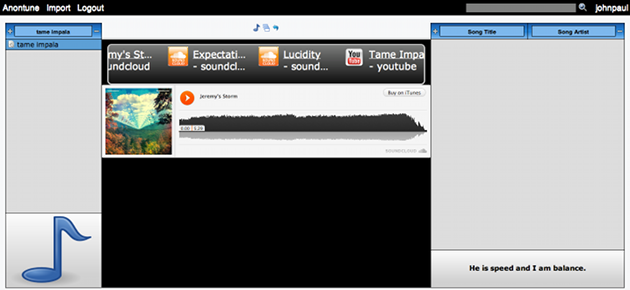
The digital music space is flourishing, yet at the same time, it remains fractured by a multitude of separate services and apps.
It’s a problem that hacktivist collective Anonymous blames on the dominance that major labels still exert over the industry. The solution, the group says, is what it calls a “fault-tolerant and open platform for social music.”
In a white paper with that very title, the group outlines its vision for how music could be consumed in the future. While they have historically come to the defense of piracy-related sites and organizations, Anonymous isn’t advocating copyright infringement. Instead, they want to disrupt the music industry by providing universal access to legal music from a single interface.
It’s an endeavor not unlike the open source desktop music app Tomahawk, which scans one’s local library and then augments with tracks from sources like SoundCloud, YouTube, Spotify and Ex.fm.
Anonymous’ solution is a Web-based app called AnonTune. The concept is quite similar to Tomahawk, albeit with a much more crude user interface. The project is nowhere near completion, Anonymous concedes, but once it’s finished the creators envision it upending the digital music space by breaking down the walls between legitimate sources of music from across the Internet.
An Olive Branch to Copyright Holders?
Even though Anonymous isn’t taking an overtly pro-piracy position, and even comes close to sympathizing with the industry’s desire to eliminate illegal downloading, it’s hard to imagine the RIAA and major record labels embracing what the hacktivist is trying to do.
Even so, AnonTune is designed to avoid legal liability by not hosting any content but rather pulling it from third-party sources. If an unauthorized song from YouTube shows up in AnonTunes, that’s Google’s problem, the group reasons.
One of the things that makes Tomahawk so comprehensive is its ability to plug into Spotify’s massive library of music, assuming one has a paid account with Spotify. Given the stake that the major labels have in Spotify, it wouldn’t be shocking to see the service deny the AnonTune Web client access to its library, if it can help it.
Right now, the project’s biggest handicap, other than limited content, is the design of its UI. To be frank, it’s hideous. This presumably will be addressed as development moves forward, especially if they want this to be something the average person is willing to use.
There are also some security concerns due to the app’s reliance on Java to run, but the developers have denied that their approach presents any security issues.
If things work out and the platform turns out to be viable, the people behind it believe it could “facilitate open research and innovation into the music listening experience.” It could take concepts such as Pandora’s Music Genome Project to the next level using things like biometric feedback and sentiment analysis of music.
Sound ambitious? These are some high-minded goals. But perhaps they’re not too far off if Anonymous is indeed onto something with this.
Read more : Can Anonymous Fix Online Music?


0 Responses
Stay in touch with the conversation, subscribe to the RSS feed for comments on this post.